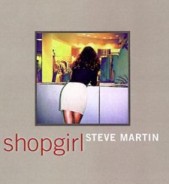Martin has been stretching himself artistically for some time now, from serious dramatic roles in movies such as "The Spanish Prisoner" to writing funny short pieces for The New Yorker's "The Back Page" ("Embarking I saw a woman standing aft, her back to me, looking very much like a Doric column would if it were leaning against a rail." -How I Joined Mensa) as well as a play, "Picasso at the Lapin Agile".
 "Shopgirl" centers around Mirabelle, a (somewhat) aspiring artist whose
day job is of clerk at the glove counter at the Beverly Hills Neiman
Marcus. The book charts, in careful detail, an abortive relationship with
Jeremy, a prototypical California slacker, as well as with Ray Porter, a
wealthy older businessman who is, emotionally, decades younger than his
age.
"Shopgirl" centers around Mirabelle, a (somewhat) aspiring artist whose
day job is of clerk at the glove counter at the Beverly Hills Neiman
Marcus. The book charts, in careful detail, an abortive relationship with
Jeremy, a prototypical California slacker, as well as with Ray Porter, a
wealthy older businessman who is, emotionally, decades younger than his
age.
This book is exquisitely detailed, carefully charting the emotional lives of the characters as well of life in the art and retail scenes of Los Angeles. The level of detail can be amazing, as in this passage where Mirabelle has just called Jeremy over to her apartment, mostly to seduce him, and the book reveals her central pleasure is being held after:
For Mirabelle, there are four levels of being held. The first, and highest, is the complete surround: he will wrap his arms around her and they will spoon as he whispers how beautiful she is and how he had been transported to another plane. The odds of this particular scenario unfolding from the youthful Jeremy are slim, in fact so slim that they could slip out the door without opening it. There are, however, other levels of holding that for tonight would suit Mirabelle just fine. He could lie on his back and she would rest her head on his chest, while one of his arms holds her tight. Third best would involve Mirabelle lying on her back with Jeremy along side her, resting one hand on her stomach while the other plays with her hair. This position requires the utterance of sweet nothings for her to be fully satisfied. She is aware he has barely spoken a sentence that didn't end in "you know" and then trail off into a mumble since they have been together, which makes the appearance of these sweet nothings unlikely. But this could be a plus, as she can interpret his mumbles any way she wants-they could be impeccably metered love sonnets for all she knows. In fourth position, they are lying on their backs, with one of Jeremy's legs resting languidly over one of hers. This is the minimally acceptable outcome, and involves a commitment of extra time on his part to compensate for his lack of effort.
One of the book's most striking features is the omniscient and analyzing narrative voice, reminiscent of the one from "The Unbearable Lightness of Being." This voice gives the reader broad summaries of what the characters really believe. These sweeping views create a tension with the high level of detail, allowing the book to capture some of the stress and ambiguity of the modern romantic landscape.
And Ray feels compelled to have the Conversation. It is appropriate tonight because of Ray's fairness doctrine: before the clothes come off, speeches must be made.
"I think I should tell you a few things. I don't think I'm ready for a real relationship right now." He saws this not to Mirabelle but to the air, as though he is just discovering a truth about himself and accidentally speaking it aloud.
Mirabelle answers, "You had a rough time with your divorce."
Understanding. For Ray Porter, that is good. She absolutely knows that this will never be long term. He goes on: "But I love seeing you and I want to keep seeing you."
"I do too," says Mirabelle. Mirabelle believes he has told her that he is bordering on falling in love with her, and Ray believes she understands that he isn't going to be anybody's boyfriend.
"I'm travelling too much right now," he says. In this sentence, he serves notice that he would like to come into town, sleep with her, and leave. Mirabelle believes that he is expressing frustration at having to leave town and that he is trying to cut down on travelling.
"So what I'm saying is that we should be allowed to keep our options open, if that's okay with you."
At this point, Ray believes that he has told her that in spite of what could be about to happen tonight, they are still going to see other people. Mirabelle believes that after he cuts down on his traveling, they will see if they should get married or just go steady.
So now they have had the Conversation. What neither of them understands is that these conversations are meaningless. They are meaningless to the sayer and they are meaningless to the hearer. The sayer believes they are heard, and the hearer believes they are never said. Men, women, dogs, and cats, these words are never heard.
They chat throughout dinner, and then Ray asks her if she would like to come to his house, and she says yes.
Over all this is an excellent and satisfying book. It's a tragedy that such pleasant little things are now priced as luxuries, but I guess that's why we have libraries. It's worth picking up this book at your local bookstore, or at Amazon (which will give a small kickback to the Blender.)